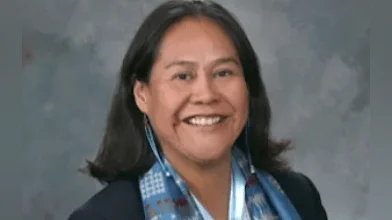The Albuquerque Police Department is short of cops, and police officers long for that to change.
That’s the view of detective Shaun Willoughby, a 19-year veteran of the force, who said the problem is directly tied to a consent agreement with the U.S. Department of Justice that has taken hundreds of officers off the street, fueling a rise in violent crime.
Willoughby, 43, is an Albuquerque native and president of the Albuquerque Police Officers' Association. He said the staffing problem is department-wide.

Albuquerque police detective Shaun Willoughby.
| Submitted
“We are severely and significantly understaffed. I believe that we are below 960 police officers,” he said. “[Mayor] Tim Keller had a goal of 1,200 officers, which would be great. I believe we should have 1,400 to 1,500 police officers with the administrative burden that has been bestowed on Albuquerque police officers as it relates to the consent decree and policies that they have to contend with here in the city of Albuquerque.
“But we are severely understaffed and we are so severely understaffed in every single entity of this police department," Willoughby added. "Whether it's crimes against children and internal affairs, force investigations, field services, responding calls for service. It's just really frustrating and it really makes our officers just more tired on top of that.”
In September 2021 the U.S. Department of Justice released new rules for jurisdictions under a consent decree, which includes Albuquerque, for how the government will monitor reform in communities. Albuquerque has been under DOJ jurisdiction for more than seven years.
The new DOJ jurisdiction guidelines limit how much cities can spend on their own monitors’ fees and outline training tools for monitors and judges who are overseeing the process.
A hearing is required after five years under DOJ jurisdiction guidelines where jurisdictions are able to prove they’ve made their own progress and potentially end their consent decree. Willoughby thinks the monitoring process is a joke and includes policies that are not considered best practice.
In February 2022, the Albuquerque Police Department shifted to a 12-hour schedule due to staffing issues. Willoughby said of the city’s approximately 960 officers, fewer than 400 are on patrol.
“The problem is that we’re understaffed everywhere," he said. "I am not a believer that if we put every single police officer that we had right now in field services, that it would control crime rate, because you have to have experts in follow up in long-term investigations, writing warrants, on phones, doing surveillance, doing follows. There is an investigative capacity of policing that needs to be flourishing as well. The problem inside Albuquerque is that we are decimated everywhere.
“You have impact detectives that do a felony crime investigation, domestic violence felony,” Willoughby said. “If it bleeds and it does not die, that is being handled by an impact detective. And then you’ve got gangs and narcotics and the gun violence reduction plan and auto theft and you’ve got homicide and crimes against children and violent sex crimes detectives. And then you have a significant amount of officers in internal affairs and on the use of force side of internal affairs. And we have tons of deputy commanders and managers in upper management all over this department. There is less than half of the sworn capacity of this police department in field services.”
This problem is compounded by officers who are leaving the department, he said.
“It’s important to understand the natural attrition rate of the Albuquerque Police Department from termination to resignation and retirement hovers at around 60 for the last 20 years,” Willoughby said. “Last year we lost 182 officers. The year before, we lost 81. And this year we’re on track to lose over 100 if things keep on going the same way.”
Willoughby said elected officials need to make this a priority.
“Although the Keller administration has been diligent in their investment in this police department and bringing competitive wages to the Albuquerque Police Department, we still have not gotten onto the track of growing the police department,” he said. “We’re still faced with this staggering amount of officers that are leaving this police department. And the challenge that is in every police department to motivate the next generation that policing is a good career.”
Officers sense they are under intense scrutiny as they do their jobs, Willoughby said. This is a major issue with the men and women who carry badges, guns and the weight of responsibility of dealing with crime in the city
“Internal affairs investigation of police officers has gone up like 1,500%," he said. "Your police officers have the use of force policy that they’re confused by. They don’t understand it. They don’t feel that the policies of the Albuquerque Police Department, which are directly related to the scrutiny and the bureaucracy associated with the DOJ consent decree, give them a recipe to do their job successfully. They’re investigated every single time.
The amount of time invested in analyzing the use of force and the amount of work and administrators' capacity that invested in the use of force investigation has crippled this police department, and made police officers “miserable,” he said.
“They don’t really enjoy being at work and the vast majority of them that I talk to are looking for other jobs,” Willoughby said.
It also deters them from being involved in incidents that could be seen as an excessive use of force, he added.
“Oh, 100%,” Willoughby said. “The last thing any officer of this agency wants to do is get into a use of force.”
Willoughby said the DOJ involvement with the police has only harmed the city and made its residents more vulnerable to crime. In 2021 the city set a record for homicides in a year, with 117 murders reported in Albuquerque.
Albuquerque had averaged around 45 homicides a year in the previous 35 years. But like many cities in the wake of the COVID-19 pandemic, the murder rate skyrocketed, with a 30% increase nationwide, according to the FBI.
“I think it’s a joke," Willoughby said. "I think that the consent decree, I ask every single time I have the opportunity to talk to the DOJ, just give me one example of success. Just one. I’ll wait. There’s none. There are no examples, right?
“We're eight years into a process that has done nothing but significantly raise crime in the city of Albuquerque. It’s caused the biggest attrition problem this police department has seen in the history of our police department,” Willoughby said. “And there’s really, looking into the future, there’s no getting out of it. In Seattle they have a consent decree there as well. And after eight years [criminals] took over downtown, created the autonomous zone and burned down the police station.”
City officials tried to deal with the consent decree, but found it a dead-end road, he said.
“I think in the first term of Mayor Tim Keller, he went with the strategy of, ‘Let’s just give the DOJ and the monitor whatever they want because we need to get through this,’” Willoughby said. “And four years later, having less success in benchmarks than he had when he came in, I think he’s now starting to realize that this is a bunch of hoopla."
On Sept. 13, 2021, Keller and Police Chief Harold Medina said they had “several concerns” about the process used by the DOJ to monitor the Albuquerque Police Department, including the heavy cost to city taxpayers.
“We appreciate that [Merrick Garland] the attorney general of the United States listened to our concerns and is making changes to reflect the realities we’re facing,” Keller said in a release. “In this city, we want to make reforms that are actually meaningful to our local communities rather than out-of-state consultants. I believe that Albuquerque has what it takes to do that while supporting our officers, tackling crime and making our city safer for people from all walks of life.”
“The people of Albuquerque demanded that we change the culture at APD, and we have made tremendous progress,” Medina said. “But the public also deserves a fully staffed police department that has the resources to focus on fighting crime. The pendulum has swung too far in the wrong direction where officers do not feel supported. We need the local flexibility to ensure we can balance fighting crime while protecting the rights of all citizens.”
Keller has few fans in the police department, Willoughby said.
“The rank and file did a survey in regards to their opinion, and I speak for the rank and file on the job performance of the mayor, and over 98% of the rank and file did not and were not pleased with his job performance,” he said. “That being said, I think that is one thing that Mayor Tim Keller has committed to and consistently been a part of, and that is to seriously look at ways to keep officers here and to try to bring new officers in.
“And I think Albuquerque police officers got a 14 to 15% pay increase in his first term, and we just got a 13.5 to 14% pay increase late last year," he added. "That is one thing that pleases me. But when it comes to really getting your nose to the grindstone and standing up for the citizens of this community and this police department against DOJ and the monitor and this craziness that we’re involved in that will never go away, I just I think that he’s not as supportive as he could be.”








